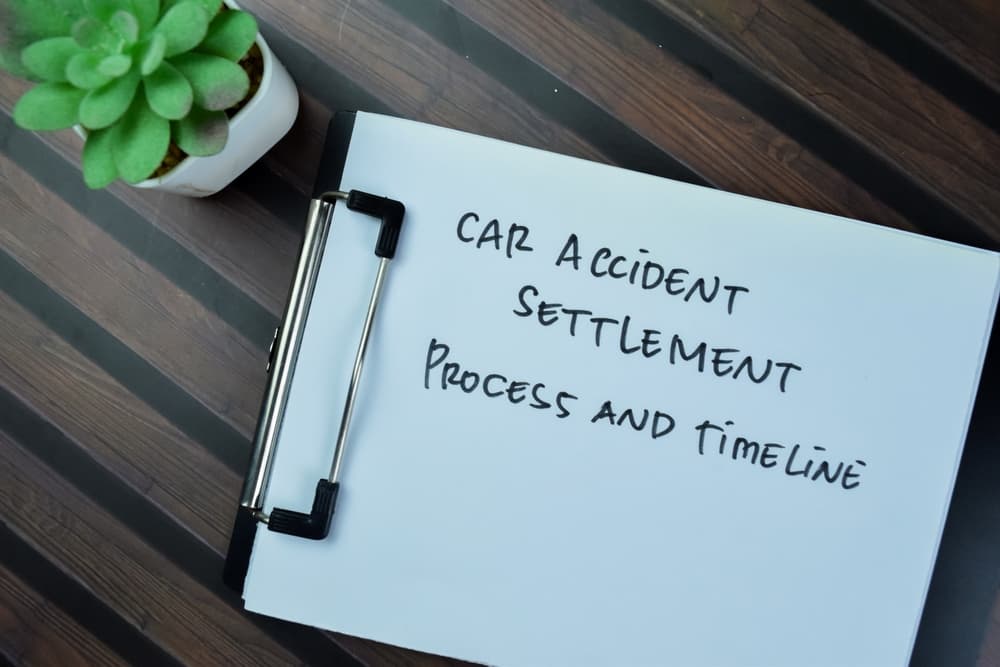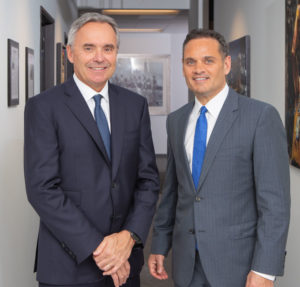Should I Take the First Offer of a Car Accident Settlement?
Should I Take the First Offer of a Car Accident Settlement?
Victims of car accidents rightfully seek compensation for their injuries and damages incurred due to the responsible party’s negligence.
Typically, this compensation comes from the at-fault party’s auto insurance company. However, insurance companies have a profit-oriented approach, which can pose challenges for accident victims.
Auto insurance companies aim to minimize payouts to maximize profits. While this strategy aligns with business goals, it raises ethical concerns and often leaves accident victims without the support they deserve.
The tactics employed by insurance companies to pay as little as possible include persuading inexperienced claimants to accept initial settlement offers. This practice may not represent the true extent of the damages suffered.
The good news for accident victims is that hiring an experienced car accident lawyer can significantly benefit the outcome of their claim.
Seasoned attorneys possess a deep understanding of insurance company strategies and are skilled at countering their tactics. Insurance companies are then more inclined to engage in a fair negotiation process.
Claimants level the playing field by enlisting a lawyer’s services promptly before engaging with insurance adjusters. This strategic move is crucial in preventing the exploitation of victims.
It protects their rights throughout the claims process. The representation of a knowledgeable attorney becomes an invaluable asset in securing fair compensation and holding negligent parties accountable for their actions.
Schedule a Free Initial Consultation
Understanding Car Accident Claim Settlements
Car accident claim settlements are negotiated agreements between an injured party and the responsible individual or their auto insurance company. In these arrangements, the party at fault pays financial compensation to cover the victim’s various damages, including medical expenses, lost income, and pain and suffering.
In return, the injured party agrees to stop pursuing their injury claim and forfeit the option to file a lawsuit. Settlements offer the benefits of time and cost savings, sparing both parties from the complexities and expenses associated with litigation. Notably, most claims opt for settlements, avoiding the courtroom and all that comes with it.
Car accident settlement negotiations can occur at different stages before the case proceeds to court or even during a trial.
Determining the best course of action—settling or going to trial—depends on the unique circumstances of each car accident case and the preferences of the injured parties.
An experienced car accident lawyer can significantly facilitate this decision-making process, providing valuable insights and ensuring the best outcome for the claimant.
Why You Shouldn’t Accept an Initial Settlement Offer

Following a car accident, the wait for a response from the insurance company can be both anxious and hopeful. While relief may accompany the arrival of the first settlement offer, always exercise caution before accepting it. Car accident lawyers often discourage immediate acceptance, and here’s the rationale behind this advice.
Insurance companies know that individuals involved in car accidents often grapple with financial challenges.
Recognizing this, they may extend a quick but low settlement offer. The objective is to persuade claimants to accept a minimal sum as soon as possible, aiming to resolve the matter with minimal expenditure of time and money on their part.
The insurance company prefers claimants to agree before consulting a knowledgeable car accident lawyer who can accurately assess the true worth of the claim.
First settlement offers are notorious for their low figures, and unfortunately, financially strained or unsuspecting claimants may accept them. Before agreeing to any settlement offer, seeking legal counsel is advisable to determine if the offer is comprehensive and equitable.
Often, these initial offers fall short, and a skilled attorney can negotiate a much higher settlement on behalf of the claimant, especially after they investigate the accident and know all the details.
Another compelling reason to resist accepting the first settlement offer is the potential for undiscovered injuries or damages. The full extent of injuries might only become apparent weeks or months later or after a thorough examination by a medical professional.
If an early settlement is accepted, there’s no opportunity to revisit the agreement and request additional compensation for unforeseen complications. Settlement agreements are final, emphasizing the importance of informed decision-making and legal guidance.
Recognizing Various Strategies Employed by Insurance Companies
Regrettably, the initial low settlement offer isn’t the sole tactic insurance companies rely on to minimize payouts for car accident claims. Familiarizing yourself with other strategies is crucial, including:
Engaging in Conversations
Insurance adjusters often project friendliness and concern, creating the impression they support your well-being. While their demeanor may appear genuine, it’s essential to recognize that anything you say can go against you to serve their interests.
For instance, a casual response like “fine” to an inquiry about how you are doing today might be misconstrued as a sign that you have fully recovered.
To safeguard your interests, limit discussions with adjusters and direct them to communicate with your attorney.
Requesting a Recorded Statement
Insurance adjusters may insist on a recorded statement detailing the car accident and your perspective. Despite claims that it’s necessary for claim processing, you do not have to provide one, so don’t.
An attorney will protect your rights effectively. If you must give a statement to help your case, your lawyer will prepare and represent you.
Intentional Claim Delays
Another common tactic involves deliberate delays in processing car accident claims. Insurance companies might remain silent for extended periods or request unnecessary documentation repeatedly. The goal is to create frustration, hoping claimants will grow weary and either abandon or forget about their claims.
Retaining an attorney communicates your commitment to a swift and fair resolution, discouraging unwarranted delays in the claims process.
Navigating the Car Accident Claim Settlement Process

Unfortunately, securing compensation for damages incurred in an auto accident is often complex and time-consuming. All car accident claimants should have a basic understanding of the process and its timeline.
Enlisting the valuable services of an experienced car accident lawyer can significantly ease this burden, allowing you to concentrate on your physical and emotional recovery.
Investigation Phase
Upon retaining legal representation, your attorney will investigate the accident comprehensively. This involves identifying the circumstances surrounding the incident, determining liability, and identifying all potential sources of compensation, usually insurance policies.
The investigative process includes:
- Examining evidence from the accident scene, such as photographs, videos, or relevant objects
- Interviewing eyewitnesses to gather firsthand accounts
- Securing surveillance videos that may provide additional insights
- Analyzing the official police report
- Collecting information from all parties involved in the accident
- Considering the possibility of hiring an accident reconstructionist to reconstruct the events
Drafting the Demand Letter
Once your car accident lawyer has carefully gathered all pertinent facts and established liability, they will compose a demand letter. This formal document serves as a professional request for payment or other corrective actions acknowledging the responsible party’s fault.
In personal injury cases, such as car accidents, the demand letter outlines the specifics of the incident, aiming to persuade the insurance company to compensate the injured party.
Responding to the Demand Letter
Upon receiving your car accident lawyer’s demand letter, the insurance companies typically have four main avenues of response:
- Acceptance of Demands: If the insurance company acknowledges and agrees to your attorney’s demands, they will proceed to make the requested payment. This results in the resolution of the matter, and you will receive the entirety of the compensation you sought. However, this is rarely the case unless liability is abundantly clear.
- Counteroffer: The insurance companies may present a counteroffer. You can accept the counteroffer and settle your claim if it is equitable. Alternatively, your attorney can continue negotiations on your behalf if the counteroffer does not meet your expectations.
- Claim Denial: In rare instances, the insurance companies may deny your claim, refusing to provide any compensation. This may occur due to a perceived lack of evidence or procedural issues. In such cases, your attorney will investigate the reasons behind the denial, address any misunderstandings, submit additional information, and initiate the settlement negotiation process.
- No Response: If the insurance company or the opposing party fails to respond promptly to the demand letter, your attorney will guide you on the next course of action. Depending on the circumstances, this may involve attempting further contact or advancing into the litigation phase.
Negotiating a Car Accident Settlement
While negotiations may extend over several months or even a year, they are often deemed worthwhile based on your car accident lawyer’s assessment and the specifics of your case.
Engaging in settlement negotiations offers the opportunity to potentially secure fair compensation for your losses. Moreover, it allows you to sidestep the prolonged court process and the potential hassle and worry of being a witness, a common concern for many accident victims.
Insurance companies are frequently inclined to settle rather than escalate a case to litigation due to the time, money, and potential impact on their reputation that court proceedings entail.
Negotiating a settlement gives the injured claimant and the insurance company more control over the case’s outcome. With an experienced car accident lawyer by your side, they can guide you on which insurance companies are more likely to offer fair settlements and which ones may resort to litigation tactics.
Accepting a Settlement
Upon accepting a settlement, you typically sign a release confirming your agreement not to pursue the same claim in court upon receipt of the settlement funds.
This release signifies a permanent waiver of your right to litigate the same incident with the same party. Your attorney will typically handle the acceptance of funds on your behalf, deducting their fees and related costs before issuing you a check.
You should also note that If multiple parties share responsibility for your losses, you may decide to settle with one party while pursuing litigation against another, contingent on the circumstances of your case and your willingness to settle. Having an attorney advocating for you proves advantageous in maximizing your compensation by holding all negligent parties accountable.
Car Accident Damages
Damages are the financial representation of the expenses, losses, and inconveniences that car accident victims suffer due to the negligence of the at-fault party. Damages will vary from one case to the next. Still, each personal injury case typically has two categories of damages: economic and non-economic.
Economic Damages
Sometimes called special damages, economic damages are how the accident victim suffered financially due to the accident.
The two primary examples are:
- Lost income
- Medical expenses such as emergency room expenses, doctor bills, medications, therapies, or medical equipment
- Property damages
- Travel expenses to and from medical appointments
Non-Economic Damages
In contrast, non-economic or general damages don’t involve money. They have no predefined monetary value.
Non-economic damages can include:
- Pain and suffering
- Scarring and disfigurement
- Humiliation
- Emotional distress
- Loss of enjoyment of life
- Loss of consortium
Avoid Accepting the Initial Settlement Offer – Consult with an Experienced Car Accident Lawyer Instead

Car Accident Lawyer, Greg Bentley & Keith More
While many car accident cases resolve through settlements before reaching the courtroom, not all do. A seasoned car accident lawyer can advise whether you should accept a settlement or pursue higher compensation through litigation.
Typically, taking the initial settlement offer won’t pay the actual value of your damages.
In certain situations, opting for a trial may be more advantageous than settling for an offer that falls short of your actual damages’ worth. Your Southern California accident and injury attorney can provide informed advice, weigh the pros and cons of accepting a settlement versus going to trial, and ensure that you choose the best option that aligns with the unique circumstances of your case.


